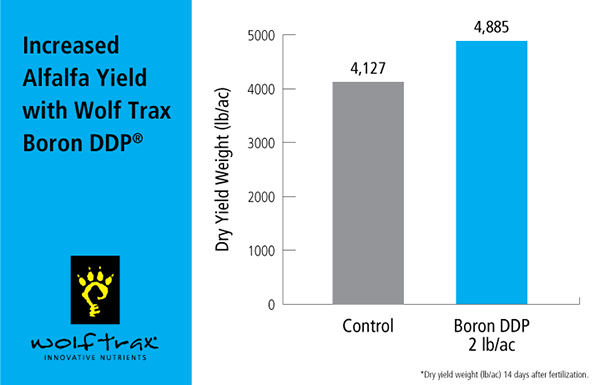
Compass Minerals includes boron along with potassium, phosphorus and sulfur in its alfalfa fertilizer recommendations. A 2015 third-party trial reinforces why farmers will want to make sure their alfalfa crops have sufficient boron fertility.
Boron is an important micronutrient for the production of high cellulosic crops like alfalfa. The forage crop requires boron for proper cell-wall formation, nitrogen metabolism and protein formation. When these processes are operating at full capacity, you benefit from higher yield.
By coating each granule in the dry fertilizer blend, Wolf Trax Boron DDP® delivers a safe and even application of the micronutrient across the field. With more points of interception, alfalfa plants can more readily access the nutrient, enabling faster re-growth.
In a replicated study conducted by Pacific Agriculture Research in Sanger, California, results showed a trend toward increased dry weight yield when Boron DDP was added to an in-season fertilizer application.
Boron DDP was coated onto a granular fertilizer blend (which included MAP and sulfate of potash) and was applied after the alfalfa’s first cut. Pacific Agricultural Research measured the second cutting’s production. The plots with 2 lb/acre of Boron DDP produced 758 more lb/acre of alfalfa in dry yield weight than the control plots with no added boron.
Based on the December 2015 USDA California Hay Report, this yield increase could be worth as much as $800 per acre to the hay farmer.

For more details on this alfalfa fertilizer trial, download the Field Insights document.
Tweet us your questions at @WolfTraxInc or comment on this blog.

